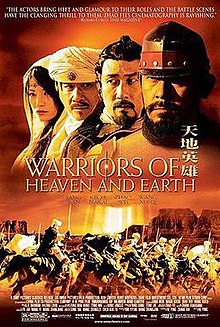|
Warriors of Heaven and Earth
Warriors of Heaven and Earth (Chinese: 天地英雄) is a 2003 Chinese action adventure film directed by He Ping. The film's notable cinematography captures a wide range of landscapes across China's Xinjiang province. It was China's official entry for the Academy Award for Best Foreign Language Film, though it did not get nominated. PlotThe film is set in western China in 700 AD during the Tang dynasty, and revolves around two protagonists, the first whom is Lieutenant Li of the Chinese army. Li's refusal to kill Göktürk women and child prisoners is classed as a mutiny, leading him to be expelled from the army and to become a fugitive, traveling through the Gobi Desert. Years later, he is saved by the survivors of a caravan which carries a powerful, mystical relic accompanied by a Buddhist monk. Li protects the caravan from Göktürks as well as the overlord of the region, Master An, who is hired by the Göktürk Khan to seize the relic. The second protagonist, a Japanese emissary, Lai Xi, is ordered by the emperor of China to kill the fugitive, Li. In a twist of fate, Lai Xi discovers that the caravan is on a mission and helps Li to defend it, to ensure that it arrives at the capital safely. They promise to fight each other only after their duty is done, although that battle never comes to pass. Cast
Soundtrack
The original score was composed by Indian composer A. R. Rahman. Warriors of Heaven and Earth: Original Motion Picture Soundtrack was released on CD featuring 14 tracks, which include excerpts from the score and 1 theme song, "Warriors in Peace", sung by Taiwanese singer Jolin Tsai.[1] Following the film's release, the score and soundtrack were released in one album separately, under the title Between Heaven and Earth. The album also include the theme song, "Warriors in Peace", in two languages, which are the Hindi version by Sadhana Sargam and English version by Sunitha Sarathy.[2] While signing the project, Rahman was working with violinist Joshua Bell on compositions based on poems by the Persian poet Rumi. This project was later cancelled.[3][4] The score is completely acoustic with symphonic pieces and relatively little electronic sounds have been used.[3] Performers of the score include The Czech Film Orchestra and Chinese soloists in Hong Kong. Other instruments, including the erhu, flute, duduk, dizi, taiko drums are featured.[3][4]
Awards and nominations11th Beijing Student Film Festival
See alsoReferences
External links |
||||||||||||||||||||||||||||||||||||||||||||||||||||||||||||||||||||||||||||||||||||||||||||||||||||||||||||
Portal di Ensiklopedia Dunia
